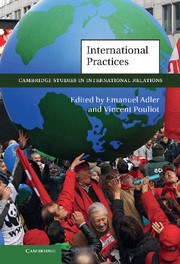Book contents
- Frontmatter
- Contents
- Figure
- Note on the contributors
- Acronyms and abbreviations
- Part I Practices in International Relations and social theory
- Part II Practices and their background
- Part III The evolution of practices
- Part IV Practices in practice
- 9 Banking on power
- 10 The practice of political manipulation
- 11 Performing practices
- 12 Privatization in practice
- Part V Conclusion
- Index
- References
9 - Banking on power
how some practices in an international organization anchor others
from Part IV - Practices in practice
Published online by Cambridge University Press: 05 June 2012
- Frontmatter
- Contents
- Figure
- Note on the contributors
- Acronyms and abbreviations
- Part I Practices in International Relations and social theory
- Part II Practices and their background
- Part III The evolution of practices
- Part IV Practices in practice
- 9 Banking on power
- 10 The practice of political manipulation
- 11 Performing practices
- 12 Privatization in practice
- Part V Conclusion
- Index
- References
Summary
Introduction
Students of world politics take different positions on the role of international organizations (IOs). For realists, IOs have little or no independent power as they are seen as epiphenomenal of the underlying distribution of material interests between great powers. For rationalists, IOs are central arenas that can help states institutionalize mechanisms to deter cheating and reduce transaction costs, thus changing state behavior and furthering cooperation between states. IOs are said to structure the interest-driven bargaining between states, thereby constraining state behavior and, partly, state interest. But rationalists stop short of ascribing agency sufficient to IOs being in a situation of power vis-à-vis states. For constructivists, however, IOs can be powerful actors in their own right, with the capacity to shape and transform state interests. Constructivists argue that IOs are actors by virtue of the expertise and normative ideals that they embed. Despite their different views on the character of IOs, however, realists, rationalists, and constructivists all draw an analytical boundary between the inside and the outside of IOs.
In this chapter, we seek to bypass the problem of how to determine the boundary of IOs and their environment by looking instead at the practices through which states and IOs interact. By focusing on the practices that structure state–IO relations, we want to capture the situated and contextualized character of how states operate within IOs, and how IOs operate vis-à-vis states. Crucially, the question of possible IO authority and autonomy may then be analyzed as the effects of concrete practices rather than as emanating from a priori defined features of IOs and/or states. We focus on the role and power of expertise in IOs, as this has been a central issue in studies highlighting their relative autonomy and authority. We argue that the link between expertise and the power of IOs may be better understood in terms of the concrete practices through which that expertise is organized in and brought to bear by IOs, and the effects thereof.
- Type
- Chapter
- Information
- International Practices , pp. 231 - 254Publisher: Cambridge University PressPrint publication year: 2011
References
- 31
- Cited by



